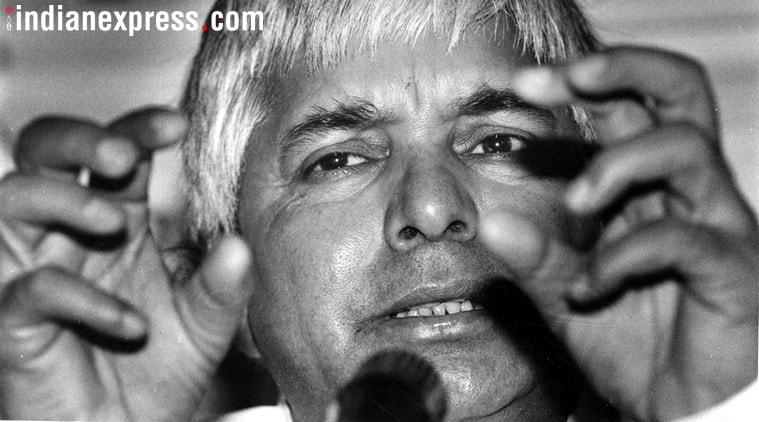 Lalu Prasad Yadav became the youngest member of the then parliament to win the seat from Chhapra at the age of 29. (Photo by Mukesh Parpiani)
Lalu Prasad Yadav became the youngest member of the then parliament to win the seat from Chhapra at the age of 29. (Photo by Mukesh Parpiani)
There are two things that come to mind at the mention of two-time Bihar chief minister Lalu Prasad Yadav — his speeches laced with humour and rustic candidness, and the ‘chara ghotala’ or the fodder scam. As Railways Minister, he had also famously replaced plastic cups for tea with ‘kulhars’ (earthen pots) and launched the all-AC Garib Rath trains.
Despite being embroiled in controversies ever since the start of his career, the Rashtriya Janata Dal (RJD) chief remains among Bihar’s most prominent leaders.
Born on June 11, 1948, in Phulwaria village of Bihar’s Gopalganj district to Kundan Rai and Marachhiya Devi, Lalu Prasad was the second eldest among six brothers. He completed his Bachelor’s degree in Law and a Masters in Political Science from B N College of Patna University. He worked as a clerk after his graduation at Bihar Veterinary College in Patna where his elder brother also worked as a peon.
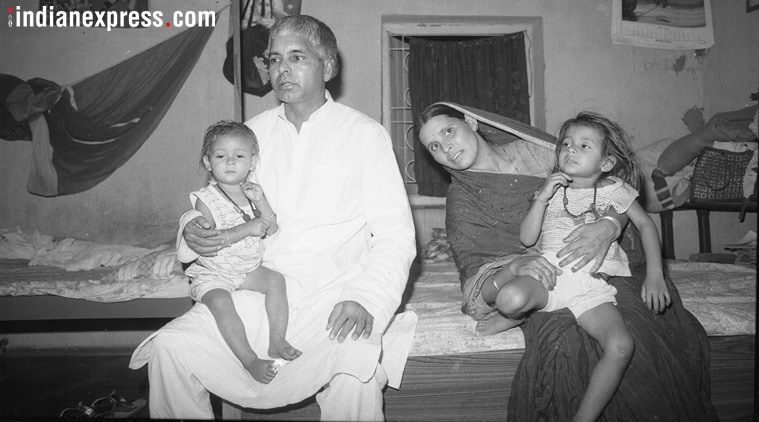 Lalu Prasad Yadav with wife Rabri Devi and their two daughters at their residence in Patna. (Express photo by Praveen Jain)
Lalu Prasad Yadav with wife Rabri Devi and their two daughters at their residence in Patna. (Express photo by Praveen Jain)
On June 1, 1973, Lalu married Rabri Devi in an arranged marriage. The couple has seven daughters and two sons. Rabri Devi served as CM of the state for three terms between 1997 and 2005. Like many politicians of his generation, Lalu Yadav took his first step into politics during his college days and by 1973 he became the president of the Student Union at Patna University. His public speaking skills were noticed and he became the Janata Party candidate in the historic post-Emergency 1977 Lok Sabha Polls.
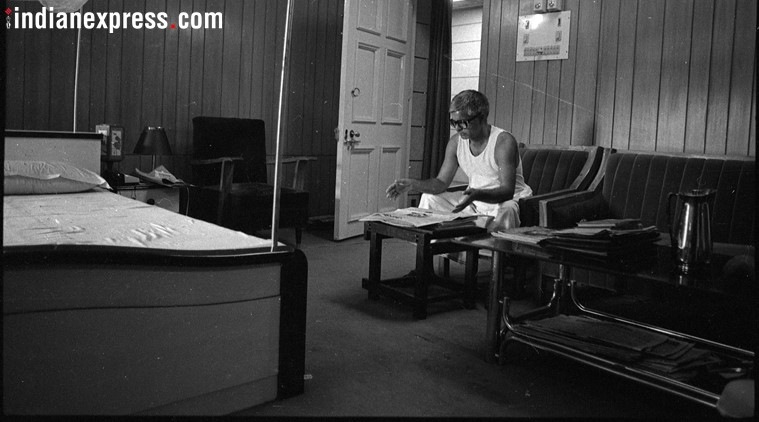 Lalu has been embroiled in controversies and named in several cases, dating back to when he was railways minister under the UPA-I government (2004-09) and Bihar chief minister (1990-97). (Express archive photo)
Lalu has been embroiled in controversies and named in several cases, dating back to when he was railways minister under the UPA-I government (2004-09) and Bihar chief minister (1990-97). (Express archive photo)
Lalu became the youngest member of the then parliament to win the seat from Chhapra at the age of 29. The Congress came back to power in 1980 and Lalu lost his Lok Sabha seat. But he managed to serve two consecutive terms as MLA of Bihar, first in 1980, and again in 1985 as Leader of Opposition in the Bihar Assembly.
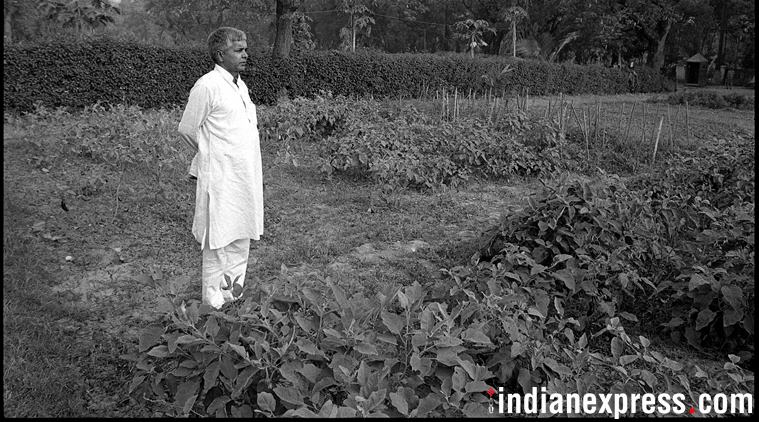 Lalu Yadav was one of the first chief ministers to be associated with the fodder scam. (Express archive photo by Praveen Jain)
Lalu Yadav was one of the first chief ministers to be associated with the fodder scam. (Express archive photo by Praveen Jain)
Later in 1989, he became a Lok Sabha MP as former Prime Minister V P Singh formed a government at the Centre. In 1990, Janata Dal came to power in Bihar and by then Lalu Yadav had positioned himself as the leader of Yadavs. The Muslim voters of Bihar shifted their loyalty from Congress to Prasad after the 1989 Bhagalpur violence. Despite all this, Lalu was not the first choice for the post of Chief Minister of Bihar as V P Singh wanted former CM Ram Sunder Das to lead the government. While former PM Chandra Shekhar backed Raghunath Jha, the deputy PM Devi Lal nominated Lalu Prasad Yadav as CM candidate. Lalu emerged victorious and became the Chief Minister of Bihar.
As chief minister, Lalu had famously got BJP stalwart L K Advani arrested on October 23,1990, and put a hold on his Ram Rath Yatra in the state. Lalu had appealed to Advani to suspend his Yatra but Advani did not pay heed leading to his arrest in Bihar’s Samastipur. This brought Lalu to the political centrestage and the V P Singh government fell.
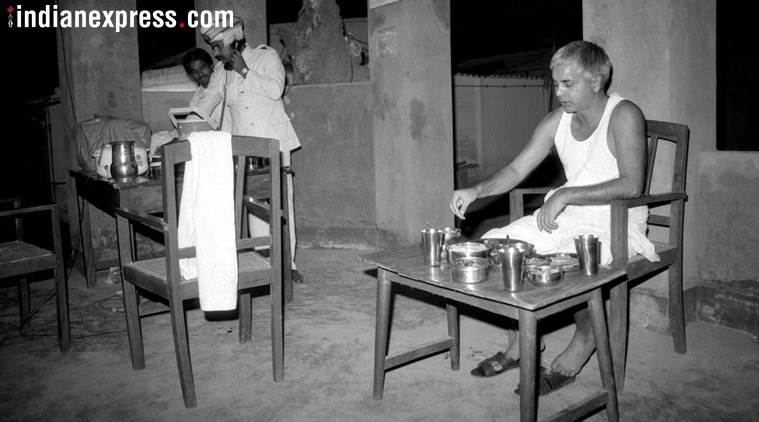 RJD chief Lalu Prasad Yadav photographed after his maiden victory and desgination as Chief Minister of Bihar in 1990 at his residence in Patna. (Express Archive photo by Praveen Jain)
RJD chief Lalu Prasad Yadav photographed after his maiden victory and desgination as Chief Minister of Bihar in 1990 at his residence in Patna. (Express Archive photo by Praveen Jain)
Lalu’s troubles started in 1997 when he was charged under the Prevention of Corruption Act in connection with the fodder scam. The CBI, which was probing allegations of embezzlement of treasury funds to non-existent companies for purchase and supply of cattle fodder in Bihar, had found alleged irregularities worth Rs 950 crore. Lalu Yadav resigned as chief minister as his then party Janata Dal pressured him to not hold office while being under criminal prosecution. He dissociated from Janata Dal and formed his own party Rashtriya Janata Dal (RJD). He resigned in July that year owing to mounting pressure but installed his wife Rabri Devi as the chief minister who won the vote of confidence in July 1997. Rabri Devi served three terms as the Chief Minister of Bihar between 1997 and 2005.
Disproportionate case
In 1998, a disproportionate assets case was lodged against Lalu. The Income Tax department, which claimed Lalu had pocketed Rs 46 lakh from the government treasury, also named Rabri as a co-accused for abetting the crime. The duo surrendered before a CBI court in 2000. Rabri, who was CM at the time, was granted bail. Lalu, too, was later granted bail by the Patna High Court. They were acquitted in the case in 2006.
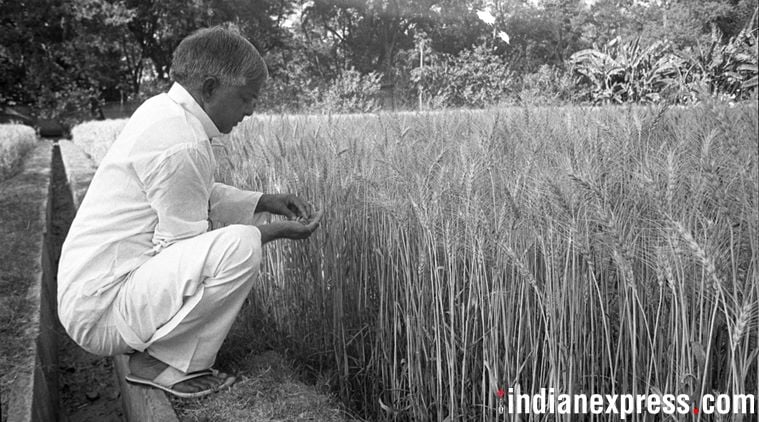 Lalu, who has been active in politics for over four decades, was instrumental in launching his wife, Rabri Devi, and sons Tejashwi Pratap Yadav and Tej Pratap Yadav in politics as well. (Express Archive photo by Praveen Jain)
Lalu, who has been active in politics for over four decades, was instrumental in launching his wife, Rabri Devi, and sons Tejashwi Pratap Yadav and Tej Pratap Yadav in politics as well. (Express Archive photo by Praveen Jain)
Though he lost the 1999 Lok Sabha polls but became a Bihar MLA in the following year, with RJD forming the government in the state and his wife Rabri Devi retaining the chief minister’s post. Lalu was elected to the Rajya Sabha in 2002 where he stayed till 2004 as he won both the Lok Sabha seats from Chapra and Madhepura against Rajiv Pratap Rudy and Sharad Yadav respectively. Lalu Prasad Yadav’s RJD won 21 seats and became a key ally of the Congress-led United Progressive Alliance (UPA) government.
From 2004 to 2009, he became the Railways Minister in the UPA government. During his tenure as a Railways Minister, he banned plastic cups to be served at railway stations and replaced them with ‘kulhars’ (earthen pots) and turned around Indian Railways from near bankruptcy to a profitable venture. Lalu is also credited for introducing the first low-fare ‘Garib Rath’, an all AC train, which provided subsidised long-distance travel to passengers. Interestingly, he never increased the rail ticket fares during his tenure as the Railways Minister.
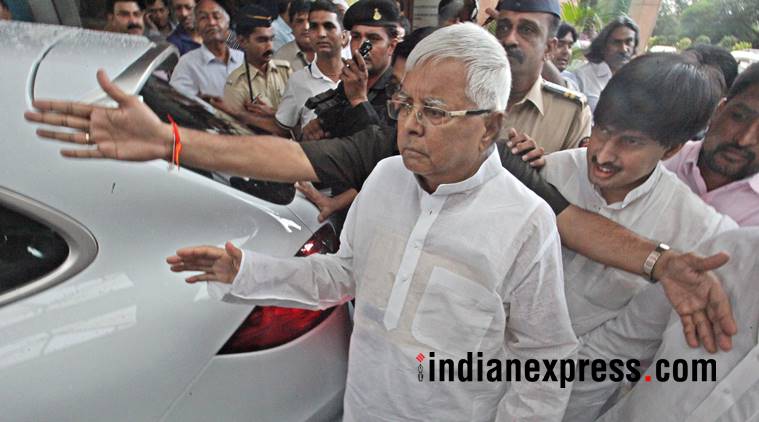 Lalu has been embroiled in controversies and named in several cases, dating back to when he was railways minister under the UPA-I government (2004-09), and Bihar chief minister (1990-97). (Express photo by Dilip Kagda)
Lalu has been embroiled in controversies and named in several cases, dating back to when he was railways minister under the UPA-I government (2004-09), and Bihar chief minister (1990-97). (Express photo by Dilip Kagda)
In a big blow to Lalu and his party RJD, Yadav was convicted in the first fodder scam case in 2013 and awarded five years in jail. The conviction also barred Yadav from contesting elections for 11 years in line with the Supreme Court order disqualifying convicts jailed for more than two years from contesting for six years after completion of their sentence. Later, he had got bail in the case.
Months after the Grand Alliance collapsed and JD(U) chief Nitish Kumar joined hands with the BJP to form a new government, Lalu was convicted in a second fodder scam case on December 23, 2017. The case pertained to fraudulent withdrawal of money to the tune of over Rs 89 lakh from Deoghar treasury between 1991 and 1994 when Yadav was the chief minister and also handled the finance department. He has been in Birsa Munda jail at Ranchi since December 23 last year, after being convicted in the second case. Currently, he is out on provisional bail for his medical treatment.
 Lalu Prasad Yadav’s political career has been a roller-coaster ride with several ups and downs. He dominated the state politics for 15 years and is known to be a crowd-puller. (File Photo)
Lalu Prasad Yadav’s political career has been a roller-coaster ride with several ups and downs. He dominated the state politics for 15 years and is known to be a crowd-puller. (File Photo)
Lalu’s elder son Tej Pratap Yadav formally joined politics post-2015 Bihar Assembly elections and won a seat from Mahua, Vaishali. Tej Pratap had earlier served as the Health Minister in the Nitish Kumar-led Grand Alliance government while his younger brother Tejaswi Yadav was the Deputy Chief Minister of Bihar.